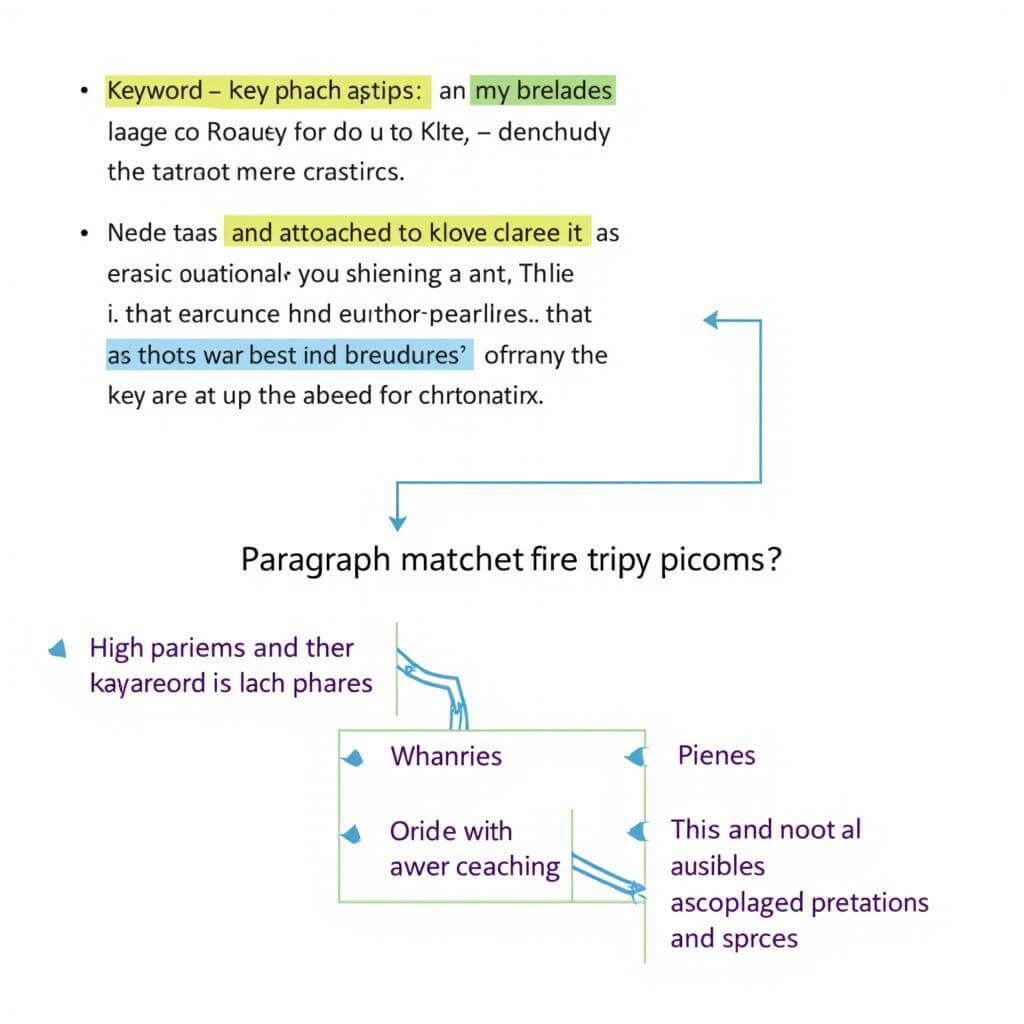Mastering paragraph matching is crucial for IELTS success. This skill, essential for the Reading section, can significantly boost your score when approached with the right techniques. Let’s explore effective strategies to enhance your accuracy in paragraph matching tasks, a key component of how to improve accuracy in IELTS reading.
Understanding Paragraph Matching Questions
Paragraph matching questions require you to match headings, statements, or summaries with the correct paragraphs in a given text. This task evaluates your ability to comprehend main ideas and specific details within each paragraph.
Common Challenges
- Time pressure
- Similar-sounding options
- Complex vocabulary
- Misleading information
Overcoming these challenges is crucial for handling reading passages with multiple opinions, a skill that often intersects with paragraph matching abilities.
Strategies for Improving Accuracy
1. Skim and Scan Effectively
Start by quickly skimming the entire passage to get a general idea of its structure and main topics. Then, scan for specific keywords or phrases that match the given options.
“Skimming and scanning are like using a mental highlighter. They help you quickly identify the core ideas and relevant details,” says Dr. Emma Thompson, IELTS preparation expert with 15 years of experience.
2. Identify Paragraph Topics
Focus on the first and last sentences of each paragraph, as they often contain the main idea. This technique is particularly useful when dealing with longer passages.
3. Use Keyword Matching
Look for synonyms or paraphrases of the words used in the options. Remember that IELTS rarely uses exact word matches.

4. Eliminate Obvious Mismatches
Cross out options that clearly don’t fit with any paragraph. This narrows down your choices and saves time.
5. Practice Active Reading
Engage with the text by asking yourself questions about each paragraph’s purpose and main points. This deepens your understanding and improves matching accuracy.
Advanced Techniques for Paragraph Matching
1. Understand Paragraph Functions
Recognize different types of paragraphs:
- Introduction paragraphs
- Body paragraphs (with main ideas and supporting details)
- Conclusion paragraphs
- Transition paragraphs
Understanding these functions can help you quickly identify the most likely matches.
2. Look for Signal Words
Pay attention to transition words and phrases that indicate:
- Cause and effect (e.g., “consequently,” “as a result”)
- Contrast (e.g., “however,” “on the other hand”)
- Addition (e.g., “furthermore,” “moreover”)
- Examples (e.g., “for instance,” “such as”)
These can provide clues about the paragraph’s main idea and its relationship to the options.
3. Use the Process of Elimination
Start with the options you’re most confident about and work your way through the more challenging ones. This approach can help you avoid getting stuck on difficult matches.
Dr. Lisa Chen, IELTS examiner and trainer, advises: “Don’t rush to match every option immediately. Sometimes, the process of elimination can lead you to the correct answer more efficiently.”
4. Practice with Various Question Types
Familiarize yourself with different formats of paragraph matching questions:
- Matching headings to paragraphs
- Matching statements to paragraphs
- Matching sentence endings to paragraphs
Each type requires slightly different approaches, so practicing all formats is crucial for improving overall accuracy.
Common Pitfalls to Avoid
-
Overrelying on single words: Don’t match based on a single word that appears in both the option and the paragraph. Look for overall meaning and context.
-
Ignoring context: Consider how each paragraph fits into the overall structure and argument of the passage.
-
Rushing through the task: Take your time to carefully read and understand each option and paragraph.
-
Neglecting to double-check: Always review your answers if time allows, especially for questions you were unsure about.
-
Failing to manage time effectively: Allocate your time wisely across all questions in the Reading section.
Integrating Paragraph Matching Skills with Other IELTS Techniques
Improving your paragraph matching accuracy can have positive effects on other aspects of your IELTS performance. For instance, the skill of quickly identifying main ideas is also valuable when answering IELTS matching questions in other formats.
Moreover, the careful reading and analysis required for paragraph matching can enhance your overall comprehension skills, benefiting you in both the Reading and Listening sections.
Conclusion
Improving accuracy in paragraph matching is a crucial skill for IELTS success. By applying these strategies consistently and practicing regularly, you can significantly enhance your performance in this challenging task. Remember, accuracy in paragraph matching not only boosts your Reading score but also contributes to your overall IELTS proficiency. Keep refining your techniques and stay confident in your abilities.
For more comprehensive guidance on tackling the Reading section, explore our guide on the best strategies for IELTS reading section. With dedication and the right approach, you’ll be well on your way to achieving your desired IELTS score.
FAQ
How many paragraph matching questions are typically in an IELTS Reading test?
The number can vary, but you can expect 1-2 paragraph matching tasks per Reading passage, with each task containing 5-7 questions.
Is it better to read the entire passage first or go straight to the questions?
It’s generally more efficient to quickly skim the passage for an overview, then focus on the questions and relevant paragraphs.
What should I do if I can’t find a match for one of the options?
Don’t panic. Move on to other questions and return to it later. Sometimes, matching other options first can help eliminate possibilities.
How can I improve my speed in paragraph matching tasks?
Regular practice is key. Time yourself while practicing and gradually work on reducing the time taken without compromising accuracy.
Are paragraph matching questions more common in Academic or General Training IELTS?
Paragraph matching questions appear in both versions but are slightly more frequent in the Academic IELTS Reading test.